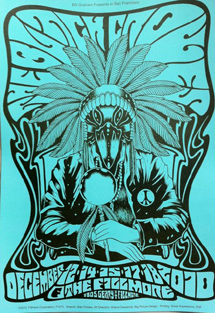
For a band that started out with a fairly stripped-raw rock sound, garnering comparisons to Exile -era Rolling Stones, and the Faces (and frequent dismissal as a mere “retro” act), the Crowes, seen here disbanding at the end of 2010, are playing an impossibly complex and dark music, cycling through every possible flavor of rock, blues, funk, and soul — on nearly every single song. “Cosmic Friend” was pretty much prog rock, a metal crunch with Dickinson twiddling simple little melodies across the top, while the red and yellow lights blazed up Roper’s sunburst backdrop. “Wee Who See The Deep” was, well, Stonesy in its way, come to think of it. It saw the two brothers face off, both on electric guitar, soloing together, getting passionate as the rhythm section set off fireworks behind them. You could see them in the basement as teenagers, this long stint together coming to a head.
It became a tight-chopped funk as the band brought it out, Rich Robinson chicka-ing the wah pedal rhythm, Dickinson soloing little blues riffs over that, and into the Angeleno funk of “Young Man, Old Man”, which became a psychedelic wandering, with Robinson ruminating thereon – then slamming into the huge rock of “I Ain’t Hiding”, and an “Ozone Mama” that was straight disco until it picked up a hiphop beat, and Robinson came in screamin’. Never forget, this motherfucker can sing.
Chris Robinson is the great voice of his generation. No one else comes close.
Whether or not they really hang it up permanently, the arc of the thing has been admirable and wise. When their first two records came out, in 1990 and 1992, they were hotter than shit – top of the Billboard charts, with hit after hit after hit: first and foremost, their cover of Otis Redding’s “Hard to Handle”, but then “She Talks to Angels,” “Jealous Again,” “Twice As Hard” — and, on The Southern Harmony and Musical Companion, “Remedy.” “Sting Me.” “Thorn In My Pride.” “Bad Luck Blue Eyes” and “Sometimes Salvation.” Radio hits all.
They could have pushed it into their own stadiums and hockey rinks. But they put out Amorica in all its paper packaging and curlicued glory, and kept playing theatres. They dialed it back. Went onto independent labels. And because they kept it low-key, the Crowes were able to keep making their music more complex and interesting, rather than having to simplify their songs and rescale their sound to come across in the big sheds.
Sure, they did The H.O.R.D.E. and some other festivals in the ampitheatres. But that basically allowed them to hook a ride off the pop charts and into a much more sustainable career, playing to rooms in which you could actually get deep and interesting, and even weird if you wanted to. They took three years off. They burrowed in, and survived the death of rock. And their own rock grew deep and vast, and mature.
It was hard to not think, as they packed the Fillmore to its very hallowed blacklit gills, invoking every corner of rock — from Pink Floyd to the James Gang, P-Funk to the Stones; Gram Parsons, Bob Marley, Skynyrd and The Outlaws and all, all encompassed within their own canon — that this was the last great rock band.
The Black Crowes were (perhaps we can speak of them now in past tense) certainly the last and best warriors of an earlier age, built in the old school tradition, around the twin-headed hydra of singer and guitarist. Blood siblings, encompassing the myth of the dueling front-personnel, with the love/hate partnership that fuels dramatic tension onstage, as well as, miraculously, the construction of a deep collection of compositions. Like the record sleeve says, All songs were written by Chris Robinson and Rich Robinson.
They may have worked hard to buck the derision of those who’d dismiss them as Stones imitators, but the Crowes embraced their inner Glimmer Twins Sunday night, the last night of the run, tour, decade, and, it would seem, career, playing “No Expectations” in the first set, and ending the second with “Midnight Rambler.” For an encore, they blasted through “Torn & Frayed”, “Just Want To See His Face”, and “Can’t You Hear Me Knockin’” — before ending it with “The Last Time.”
Well, this could be the last time
This could be the last time
May be the last time, I don’t know
Any of ‘em might kick you right now for saying so.
But it’s hard to believe The Black Crowes won’t be back.


No Comments comments associated with this post